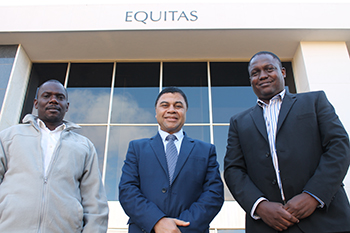Latest News Archive
Please select Category, Year, and then Month to display items
04 April 2024
|
Story Lunga Luthuli
|
Photo SUPPLIED
 Dr Juliet Kamwendo champions gender-inclusive climate action in Africa. Her expertise at the recently held AFR100 workshop highlighted vital steps towards sustainable and equitable development.
Dr Juliet Kamwendo champions gender-inclusive climate action in Africa. Her expertise at the recently held AFR100 workshop highlighted vital steps towards sustainable and equitable development.
Dr Juliet Kamwendo, Lecturer and Programme Director for Gender Studies in the Centre for Gender and Africa Studies at the University of the Free State, is spearheading efforts to integrate gender considerations into Africa's climate restoration agenda. Reflecting on her involvement, Dr Kamwendo stated, "This is particularly crucial, as women make up almost 50% of the population in Africa, and the depletion and degradation of land affect them disproportionately."
She recently served as a gender expert at the AUDA-NEPAD AFR100 workshop in Ouagadougou, Burkina Faso, from 25 to 29 March 2024. This initiative aims to restore forests and degraded land across Africa by 2030, with a focus on gender equality.
The workshop emphasised the integration of gender perspectives into the AFR100 project, acknowledging the disproportionate impact of land degradation on women. Dr Kamwendo's expertise highlighted the need to empower women in climate change interventions, addressing existing gender inequalities exacerbated by environmental degradation.
“Women – who are primarily responsible for household food security and water provision – bear the brunt of environmental degradation, leading to increased workloads, reduced income opportunities, and heightened vulnerability to climate-related disasters. Furthermore, the loss of forest cover and biodiversity further exacerbates the challenges faced by women, particularly in rural areas where they depend heavily on natural resources for their livelihoods,” added Dr Kamwendo.
Her participation highlights academia's crucial role in fostering inclusive and sustainable development, emphasising interdisciplinary collaboration to tackle complex environmental challenges. Through initiatives such as AFR100, stakeholders are working towards a more resilient and gender-responsive future for Africa.
UFS hosts YSI for first conference of its kind in Africa
2017-06-13

From the left: Bryson Nkhoma, a doctoral student from
the International Studies Group, Prof Francis Petersen,
Rector and Vice-Chancellor of the UFS, and
Dr Tinashe Nyamunda, a postdoctoral fellow from the
International Studies Group.
Photo: Siobhan Canavan
In the first conference of its kind on the African continent, the University of the Free State’s Bloemfontein Campus was privileged to host the Young Scholars Initiative (YSI) conference.
Reflecting on the African experience
A total of 65 young and senior scholars from five continents attended the conference Decolonising Africa? The Economic History of Development, hosted by the YSI in partnership with the International Studies Group at the UFS.
The conference, held on 8 and 9 June 2017, provided an opportunity to reflect on the African experience from an historical perspective and to assess the current position of the continent in the global economy. It discussed new themes in development, such as the role of women, minorities and entrepreneurs.
The conference focused on how the business community has operated in an Africa that still faces inequalities and unfair terms of trade and lacks a unified political will.
Keynote speakers at conference
Prof Francis Petersen, Rector and Vice-Chancellor of the UFS, said decolonisation was not self-explanatory. “In its radical form, decolonisation presents two polar opposites. On the one side is white privilege and on the other is black pain.”
Prof Ian Phimister, Senior Research Professor at the Centre for Africa Studies at the UFS presented the opening keynote address entitled International Imperialism: The Violent Making of Southern Africa, 1884-1914.
Other keynote speakers included Prof Sabelo Ndlovu Gatsheni from the University of Pretoria, Prof Gareth Austin from the University of Cambridge, and the closing keynote by Prof Alois Mlambo from the University of Pretoria.